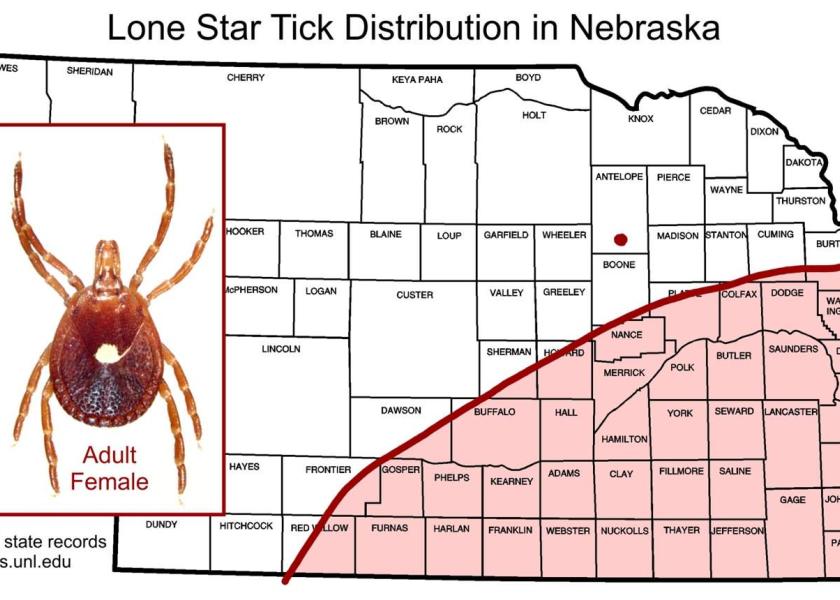Practice Tick Safety to Avoid Getting an Allergy to Red Meat

Spring is an appropriate time for tick education. Ticks may be active all year long if temperatures outside are above freezing, but May and June are the months when people pick up the most ticks. There are three tick species established in Nebraska that carry and spread diseases to humans and animals, including the lone star tick. Lone star ticks are widely distributed across the East, South and Central United States, extending across the southeastern portion of Nebraska (see figures at the end of the article). It is the second most frequently reported tick and its bite may trigger a potentially life-threatening allergic reaction in humans after they eat red meat.
The red meat allergy, also called alpha-gal syndrome, is a delayed allergic reaction to red meat. The source of this allergy is a sugar molecule, alpha-gal (galactose-alpha-1,3-galactose) that is found in meat and other products from non-primate mammals, including beef, pork, venison, and rabbit. Alpha-gal is also in the saliva of lone star ticks and enters the human body by a tick bite. Then, when people with alpha-gal in their body eat red meat, the human immune system has a strong response. Symptoms of red meat allergy can occur 2 to 8 hours after a person eats red meat and can range from mild to severe to life-threatening anaphylaxis. Symptoms may include itching, hives, vomiting, diarrhea, swelling of the tongue and throat, difficulty breathing, dizziness and gastrointestinal pain.
There is no cure for red meat allergy. Mild symptoms can be treated with antihistamines while severe allergic reactions require emergency medical attention and epinephrine. To prevent allergic reactions in the future, a person diagnosed with red meat allergy must stop eating red meat. In some individuals, the severity of the allergy diminishes over time (sometimes several years) if there are no further exposures to lone star tick bites and saliva.
To prevent the red meat allergy, avoid bites by lone star ticks.
- Reduce the number of ticks brought into the house by putting field clothes in a clothes dryer on high heat for 30 minutes.
- Repellents applied to skin have limitations, but permethrin-treated field clothes can be worn several times and still reduce tick exposure.
- Regular, full body, tick checks on your person should be performed after coming in from the pastures. Lone star ticks are aggressive and will bite on the lower legs.
- Remove ticks from body as soon as possible. Use care when removing embedded ticks.
- Record or report tick activity to Tick Tag Go
If you do find a tick, do not discard it before identification and documentation. Tick Tag Go is a community-science project designed to passively survey ticks found in Nebraska. By joining the iNaturalist project you can submit your tick photos for identification and contribute and view maps of tick species found in the state.







